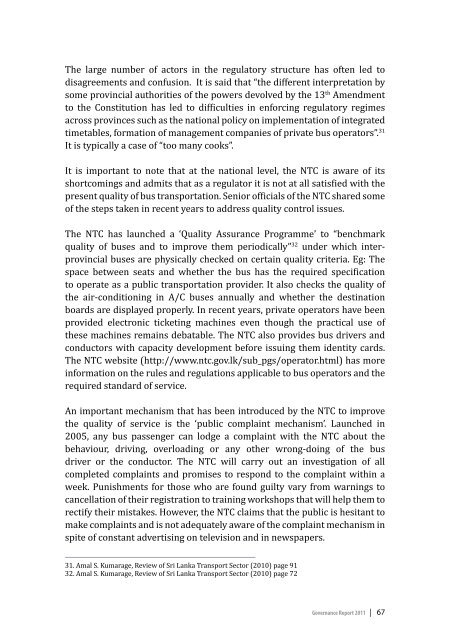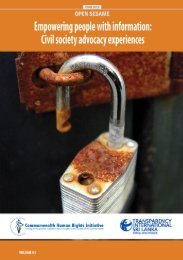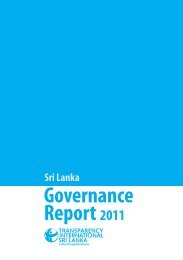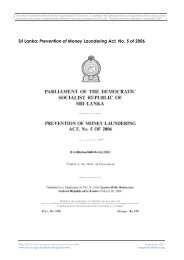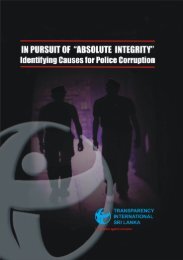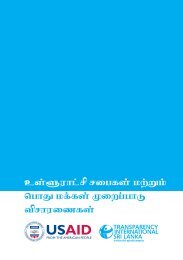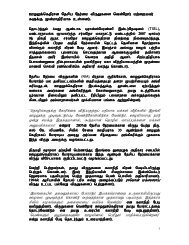Governance Report 2011 - Transparency International Sri Lanka
Governance Report 2011 - Transparency International Sri Lanka
Governance Report 2011 - Transparency International Sri Lanka
Create successful ePaper yourself
Turn your PDF publications into a flip-book with our unique Google optimized e-Paper software.
The large number of actors in the regulatory structure has often led to<br />
disagreements and confusion. It is said that “the different interpretation by<br />
some provincial authorities of the powers devolved by the 13 th Amendment<br />
to the Constitution has led to difficulties in enforcing regulatory regimes<br />
across provinces such as the national policy on implementation of integrated<br />
timetables, formation of management companies of private bus operators”. 31<br />
It is typically a case of “too many cooks”.<br />
It is important to note that at the national level, the NTC is aware of its<br />
shortcomings and admits that as a regulator it is not at all satisfied with the<br />
present quality of bus transportation. Senior officials of the NTC shared some<br />
of the steps taken in recent years to address quality control issues.<br />
The NTC has launched a ‘Quality Assurance Programme’ to “benchmark<br />
quality of buses and to improve them periodically” 32 under which interprovincial<br />
buses are physically checked on certain quality criteria. Eg: The<br />
space between seats and whether the bus has the required specification<br />
to operate as a public transportation provider. It also checks the quality of<br />
the air-conditioning in A/C buses annually and whether the destination<br />
boards are displayed properly. In recent years, private operators have been<br />
provided electronic ticketing machines even though the practical use of<br />
these machines remains debatable. The NTC also provides bus drivers and<br />
conductors with capacity development before issuing them identity cards.<br />
The NTC website (http://www.ntc.gov.lk/sub_pgs/operator.html) has more<br />
information on the rules and regulations applicable to bus operators and the<br />
required standard of service.<br />
An important mechanism that has been introduced by the NTC to improve<br />
the quality of service is the ‘public complaint mechanism’. Launched in<br />
2005, any bus passenger can lodge a complaint with the NTC about the<br />
behaviour, driving, overloading or any other wrong-doing of the bus<br />
driver or the conductor. The NTC will carry out an investigation of all<br />
completed complaints and promises to respond to the complaint within a<br />
week. Punishments for those who are found guilty vary from warnings to<br />
cancellation of their registration to training workshops that will help them to<br />
rectify their mistakes. However, the NTC claims that the public is hesitant to<br />
make complaints and is not adequately aware of the complaint mechanism in<br />
spite of constant advertising on television and in newspapers.<br />
31. Amal S. Kumarage, Review of <strong>Sri</strong> <strong>Lanka</strong> Transport Sector (2010) page 91<br />
32. Amal S. Kumarage, Review of <strong>Sri</strong> <strong>Lanka</strong> Transport Sector (2010) page 72<br />
<strong>Governance</strong> <strong>Report</strong> <strong>2011</strong> | 67


